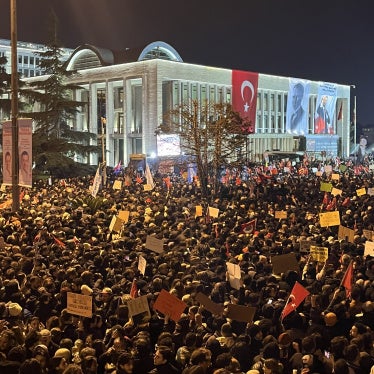We are writing on the eve of your meeting with Croatian Prime Minister Ivo Sanader, to urge that you use this meeting as an opportunity to clarify that European Union (E.U.) membership negotiations with Croatia cannot start until full cooperation with the International Criminal Tribunal for the former Yugoslavia (ICTY).
Dear Chancellor Schröder,
We are writing on the eve of your meeting with Croatian Prime Minister Ivo Sanader, to urge that you use this meeting as an opportunity to clarify that European Union (E.U.) membership negotiations with Croatia cannot start until full cooperation with the International Criminal Tribunal for the former Yugoslavia (ICTY), including good faith efforts to arrest and surrender indicted war crimes suspect General Gotovina, has been confirmed by the ICTY prosecutor. This is a position repeatedly expressed by the E.U. General Affairs Council, and it is of crucial importance that the message you convey to Prime Minister Sanader reflects this position.
We hope that you will also raise the issue of refugee returns and the need for genuine efforts by Croatian authorities to bring to justice, before domestic courts, war crimes suspects not tried before the ICTY as conditions for Croatia’s E.U. membership. Given the significant political and economic ties between the two countries, we believe that Germany is particularly well positioned to raise these concerns and impress upon the Croatian leadership the importance the E.U. attaches to concrete progress in these areas.
Refugee Returns
Shortcomings in Croatia’s record on refugee returns have been a long-standing concern for Human Rights Watch. On September 3, 2003, we issued a comprehensive, 61-page report, “Broken Promises: Impediments to Refugee Return to Croatia,” describing the plight of displaced Croatian Serbs and urging that the European Union condition Croatia’s membership application on tangible progress on returns.
According to the Croatian government, approximately 300,000 ethnic Serbs left their homes during the 1991-95 war. According to other estimates, this figure is believed to be closer to 350,000. As of late 2003, according to the government, 108,000 persons had registered as returnees. The number of returnees who actually stay in Croatia, however, is far below this number. Field surveys conducted by the Organization for Security Cooperation and in Europe (OSCE) Mission in Croatia, the Croatian Red Cross, and nongovernmental organizations acting as implementing partners to the office of the United Nations High Commissioner for Refugees (UNHCR) suggest that in most areas, only about 60 percent of registered returnees are still in the area, the rest having moved back to Serbia-Montenegro or elsewhere. In some parts of Croatia, the percentage of sustainable returns falls far below 50 percent.
A significant impediment to return is constituted by the difficulties Serbs face in returning to their pre-war homes. These difficulties range from the inability to repossess property held by temporary occupants, to former tenancy-rights holders’ inability to repossess their apartments, get other homes as a substitute, or receive fair compensation. Fear of arbitrary arrest on war-crimes charges and discrimination in employment and pension benefits also deter return.
The European Commission’s Stabilisation and Association (SAP) Report of 2003 stressed the need for the Croatian government to create social and economic conditions aimed at improving the climate for returns and the acceptance of returnees by receiving communities. As documented in our September 2003 report, circumstances surrounding employment practices often indicate that Serb applicants cannot get employment because of their ethnicity. In most areas of return, virtually no Serbs are employed in state, municipal, or town-run services and institutions, such as health centers, schools, child-care centers, post offices, or power-supply companies. The situation is identical in the judiciary, the police, and the state administration, in spite of the enactment in December 2002 of the Constitutional Law on the Rights of National Minorities, which mandates proportional representation of minorities in these areas.
Human Rights Watch believes that these problems are a result of a long-standing practice of ethnic discrimination against Serbs by the Croatian government. A number of United Nations treaty monitoring bodies, including the Committee on Economic, Social and Cultural Rights, the Human Rights Committee, and the Committee on the Elimination of Racial Discrimination, have reached the same conclusion on the occasion of their most recent reviews of Croatia.
Until recently, Croatian authorities had not attempted to build an atmosphere in which the populace would welcome the return of Croatian Serbs. Instead, the authorities consistently prioritized the needs and rights of ethnic Croats—including Croat refugees from Bosnia—over the rights of Serb refugees and returnees. While it may be too early for a definitive assessment of the new government’s stance on this matter, public statements and gestures by the current government have been encouraging. Since taking office in December, Prime Minister Sanader has repeatedly invited Serb refugees to return to Croatia. On December 18, 2003, he signed an agreement with Serb representatives in the Croatian parliament, pledging to make improvements for the Serb minority in various sectors of political and social life. The new prime minister also extended an important symbolic gesture by using a traditional Serb greeting on the occasion of the celebration of the Serb Orthodox Christmas in January 2004.
While these gestures and pledges are significant, the true test of the commitment and ability of the new Croatian government to facilitate refugee return and respect the rights of ethnic Serbs is concrete activity on the ground. To assess developments in this regard, and in order to compare the situation with that preceding the release of the report “Broken Promises,” Human Rights Watch conducted extensive field research in Croatia last month. Our preliminary findings suggest that on the key issues affecting refugee return, the situation has not significantly changed.
The new government has recently set new deadlines by which it intends to definitively resolve the significant property-related problems impeding return, including ensuring repossession by June 2004 of private properties illegally held by temporary occupants. It should be firmly required to meet the new – and long overdue – deadlines. Past experience mandates caution in approaching the government’s pledges, and careful monitoring of its fulfillment. The previous government had committed itself to return all occupied properties first by the end of 2002, and then by the end of 2003; both deadlines expired with the government failing to meet the set objectives.
It is of utmost importance that the international community, in particular the E.U., submits to close scrutiny the return-related policies of the Croatian government. Croatia’s aspiration to join the Union has created a historic momentum for reform and puts the E.U. and its individual member states in a particularly suitable position to encourage Croatia to fulfill its human rights obligations.
War crimes accountability
Human Rights Watch is concerned that Croatia’s judiciary, similar to other national judiciaries in the territory of the former Yugoslavia, is not currently equipped to handle war crimes cases in a manner that fully respects internationally recognized fair trial standards. The problems identified are of great concern for a number of reasons, including the negative effects of flawed war crimes prosecutions on the return of refugees.
As documented in our September 2003 report and recently corroborated with overwhelming statistical evidence by the OSCE, war crimes prosecutions in Croatia have been severely biased, to the detriment of the Serb minority. In a report published last week, the OSCE found that, in 2002, Serbs represented 28 of 35 war crimes arrests; 114 of 131 persons under judicial investigation; 19 of 32 persons indicted; 90 of 115 persons on trial; and 47 of 52 persons convicted. The report concluded that this trend appeared to continue in 2003. Conviction rates in 2002 were also much higher for Serbs than for Croats: 83 per cent of all Serbs put on trial for war crimes (47 of 57) were found guilty, while only 18 per cent of Croats (3 of 17) were convicted.
A recent example illustrating the problem of ethnic bias in the judiciary is the case of Ivanka Savic, a Croatian Serb woman tried before the Vukovar District Court in Croatia and sentenced on January 21, 2004 to four and a half years of imprisonment for war crimes. Some of the crimes for which she was convicted—on dubious evidence—include theft and compelling an ethnic Croat serve and cook for her. Key legal issues in the case were never examined, including whether the crimes concerned met all the criteria for war crimes, whether there was a nexus between the acts of which the defendant was accused and the armed conflict, and whether other conditions for applying the Fourth Geneva Convention were met. Moreover, while Croatian Serbs have been prosecuted for such crimes, our research has not revealed any cases in which ethnic Croats were prosecuted for war crimes stemming from similar facts.
Human Rights Watch has learned that the Croatian state prosecutor is committed to personally reviewing outstanding war crime indictments and supporting evidence, with a view to dropping those indictments for which no credible evidence against the suspect exists. This would be a major improvement in this sensitive area impeding refugee return. However, a notice of caution is warranted in light of the fact that a state-wide review of the outstanding war crime indictments has already been ongoing for two years, while abuses of prosecutorial authority have continued unabated.
We hope that you will be able to raise these pressing concerns with Prime Minister Sanader. We thank you for your attention and wish you a productive meeting.
Sincerely,
Rachel Denber
Acting Executive Director
Europe and Central Asia Division
Lotte Leicht
Brussels Office Director








